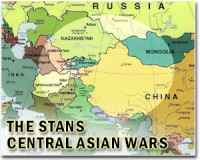 |
Islamabad, Pakistan (UPI) Apr 12, 2011 The effect of the Afghan war on Pakistan is stunting the country's democratic development and economic prosperity, Pakistani President Asif Ali Zardari said. Fighting across Pakistan's western border is "destabilising" Pakistan, Zardari said in an interview with the British newspaper The Guardian. "Our emphasis has been on security rather than our commerce and we need commerce for our survival," he said. "We have all the gas in the world waiting to go through to markets in India and the Red Sea, but it cannot be brought in until Afghanistan is settled. So Afghanistan is a growth issue for us. I think most of the time, the quantification of the effect of the war is not calculated (by the United States)." The Afghan war is happening at a time when Pakistan is trying re-establish democratic principles, institutions and government, many of which suffered under former military dictators, Zardari said. Since independence from British colonial rule in 1947, the military ruled Pakistan from 1958-71, 1977-88 and from 1999-2008. Gen. Pervez Musharraf, the last military ruler, took power in October 1999 through a bloodless military coup d'état on the democratically elected government of Prime Minister Nawaz Sharif. In November 2007, Musharraf stepped down as the country's military leader, the day before he was to be sworn in for a third presidential term but as a civilian. But in August 2008, Musharraf resigned as president amid calls for his impeachment. In the presidential election that followed, Zardari of the Pakistan People's Party won a landslide majority. But it will take time to establish a more firmly rooted democracy in Pakistan with its more than 170 million people -- it's the sixth most populous country in the world and has the second largest Muslim population after Indonesia. "Democracy is evolving," Zardari told The Guardian. "It's a new democracy. It takes time to bring institutions back." Despite being allies, there is an acute awareness in Pakistan of U.S. criticism of Islamabad's place in the war on terror and relations with rebels such as the Taliban and al-Qaida. "I think it is maybe 12 years since America has become engaged in Afghanistan and obviously everybody's patience is on edge, especially the American public, which is looking for answers," Zardari said. In June 2004 President George W. Bush improved relations with Pakistan by formally naming it as a major non-NATO ally, a move recognizing Islamabad's contribution to the fight against al-Qaida. Greater shared intelligence and inter-governmental security contacts ensued including the use of Pakistani air bases by U.S. forces. But U.S. concerns over Islamabad's effectiveness in the fight against terrorism was highlighted earlier this month in the semi-annual White House report to Congress. The report is designed to judge progress in the war in Afghanistan and operations against al-Qaida in Pakistan. Pakistan struggles to hold areas cleared of the al Qaida-linked fighters in Pakistan's border tribal areas. "There remains no clear path toward defeating the insurgency in Pakistan, despite the unprecedented and sustained deployment of over 147,000 forces," the report said. Zardari said Pakistan is doing everything it can to fight the war on terror, but U.S. criticism of Pakistan is due partially to each new U.S. administration's perspective. "The United States has been an ally of Pakistan for the last 60 years," Zardari said in The Guardian interview. "We respect and appreciate their political system. So every time a new parliament comes in, new boys come in, new representatives come in, it takes them time to understand the international situation." Diplomatic tensions increased last month when a Pakistani court freed CIA operative Ray Davis after acquitting him of two counts of murder, when relatives of two Pakistani men he shot dead pardoned him in court. Compensation payments are believed to have been made to the aggrieved families. His release led to anti-American feeling across Pakistan, including angry demonstrations. Hard-line religious parties wanted the CIA operative punished. In around three months President Barack Obama will announce the pace at which U.S. troops will withdraw from Afghanistan.
Share This Article With Planet Earth
Related Links News From Across The Stans
 US army apologizes for pictures of abuse in Afghanistan
US army apologizes for pictures of abuse in AfghanistanWashington (AFP) March 21, 2011 The US Army on Monday formally apologized "for the distress" caused by pictures portraying abuse allegedly committed by US troops serving in Afghanistan. "We apologize for the distress these photos cause," said a statement released by the Army. German weekly Der Spiegel earlier Monday published photos that it said showed two US soldiers in Afghanistan from a rogue army unit posing with d ... read more |
|
| The content herein, unless otherwise known to be public domain, are Copyright 1995-2010 - SpaceDaily. AFP and UPI Wire Stories are copyright Agence France-Presse and United Press International. ESA Portal Reports are copyright European Space Agency. All NASA sourced material is public domain. Additional copyrights may apply in whole or part to other bona fide parties. Advertising does not imply endorsement,agreement or approval of any opinions, statements or information provided by SpaceDaily on any Web page published or hosted by SpaceDaily. Privacy Statement |